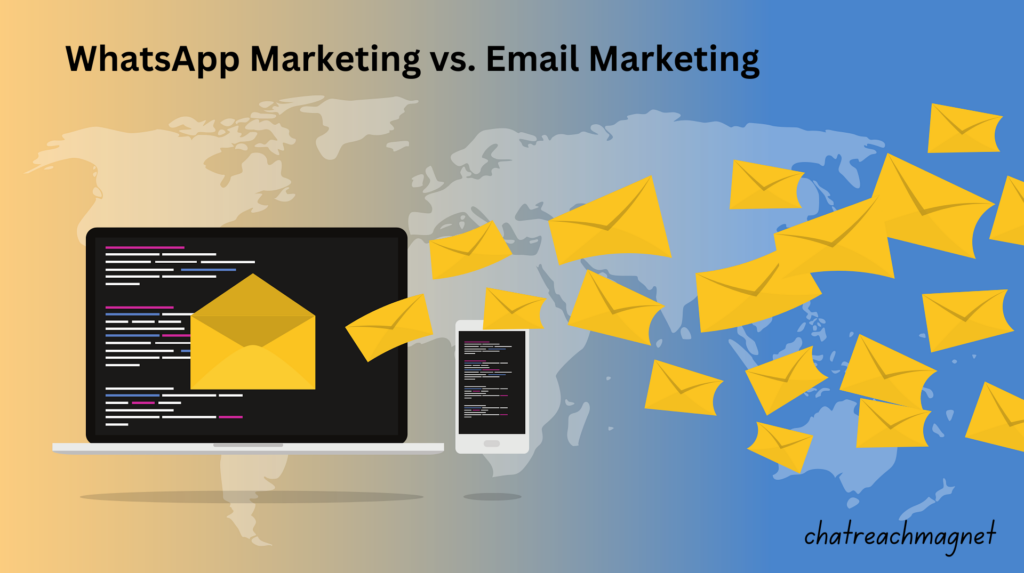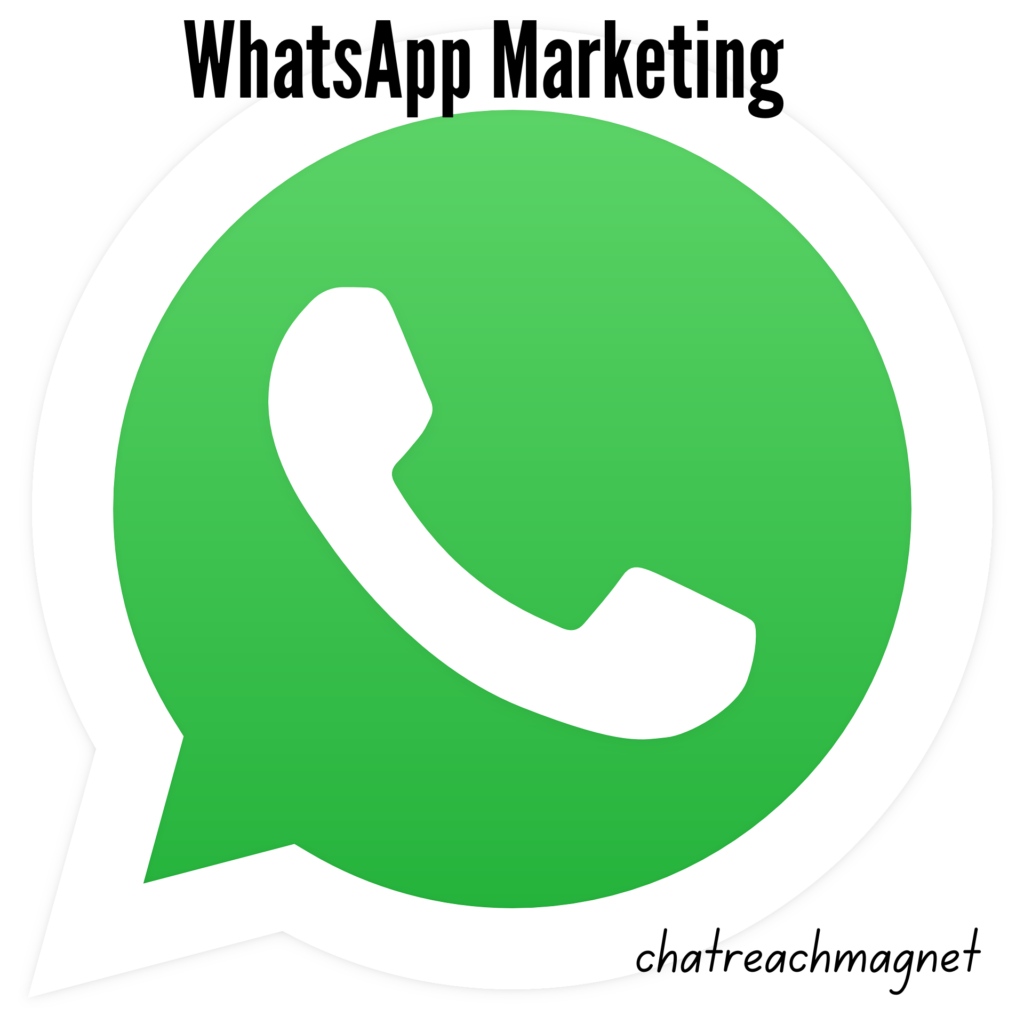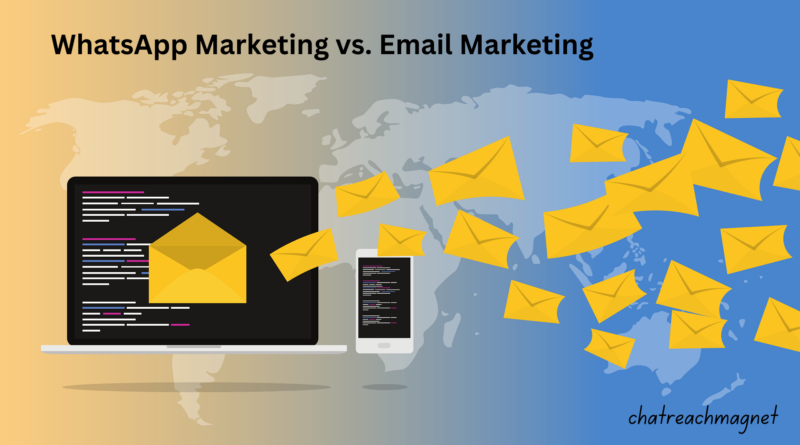WhatsApp Marketing vs. Email Marketing: 30+ reasons to choose?
WhatsApp marketing vs. Email marketing let’s begin with the narration that, in today’s era, effective communication with customers is very important for businesses seeking to thrive in these competitive markets.
With numerous channels available, selecting the most efficient platform for marketing business areas can be daunting. Among the contenders, WhatsApp Marketing has emerged as a powerful tool, offering unparalleled immediacy, engagement, and personalization.
In this era of instant connectivity, WhatsApp’s real-time interaction capabilities have reshaped how businesses engage with their audience, often outperforming traditional methods like Email Marketing.
When talking about WhatsApp Marketing, remember that personalization is key. Unlike email marketing, WhatsApp offers an intimate environment for communication of various kinds. Leveraging this by giving businesses messages a certain liberty communicating with customers according to preferences and behaviors.
From personalized greetings to targeted suggestions, every interaction should resonate with the recipient, fostering a unique feeling of connection and loyalty. By prioritizing personalization in your WhatsApp marketing strategy, you can elevate engagement levels and drive impactful results more than in most cases of email marketing.
Read Also: 20 Proven Strategies for WhatsApp Sales
30+ reasons to choose among WhatsApp Marketing vs. Email Marketing

WhatsApp Marketing vs. Email Marketing Have so many similarities, but in the meantime let’s discuss some reasons to choose between them;
#1. Higher Open Rates: WhatsApp messages generally have higher open rates compared to emails due to its simple interface.
#3.Instant Delivery: WhatsApp messages are delivered instantly, ensuring timely communication between business partners.
#4. Real-Time Interaction: WhatsApp enables real-time interaction with customers, fostering immediate engagement.
#5. Personal Connection: WhatsApp allows for more personal and direct communication, strengthening the bond with customers.
#6. Higher Engagement: Users are more likely to engage with WhatsApp messages due to their interactive nature than email.
#7. Multimedia Capabilities: WhatsApp supports various multimedia formats, enhancing communication with images, videos, and voice messages.
#8. Group Messaging: You can create groups on WhatsApp to engage with multiple customers simultaneously, facilitating instant community.
#9. Push Notifications: WhatsApp sends push notifications to users, ensuring that messages are promptly seen once delivered to users.
#10. Higher Response Rates: Users tend to respond more actively to WhatsApp messages compared to emails.
#11. Mobile-Friendly: WhatsApp is rated high in traffic for mobile devices, where users spend a commendable amount of time amount of their time making it awesome for marketing.
#.12 Cost-Effective: WhatsApp marketing can be more cost-effective than email marketing, especially for smaller businesses.
#13. Personalized Communication: WhatsApp allows for personalized communication tailored to individual customers, increasing relevance and the possibility for instant response.
#14. Higher Conversion Rates: Due to its immediacy and personalization, WhatsApp often leads to higher conversion rates.
#15. Customer Feedback: WhatsApp provides a platform for instant feedback and communication between business owners and customers, aiding in customer satisfaction and retention.
#16. Global Reach: WhatsApp has a vast global user base, allowing businesses to reach a diverse audience across different regions on a business scale.
#17. Integration with CRM Systems: WhatsApp can be integrated with CRM systems for better customer management and tracking.
#18. Verified Business Accounts: WhatsApp offers verified business accounts, adding credibility to your marketing efforts and building trust with customers.
#19. Higher Accessibility: WhatsApp is more accessible as users are more likely to have it installed on their mobile devices compared to email apps.
#20. Viral Potential: Messages can be easily shared on WhatsApp, potentially reaching a wider audience through viral marketing.
#21. Rich Profiles: WhatsApp profiles can include detailed descriptions of businesses, helping in brand recognition and credibility.
#22. Customer Segmentation: You can segment your WhatsApp contacts based on various facts like interest, behavior, targeted marketing, and personalized messaging.
#23. Higher Deliverability: WhatsApp messages are less likely to end up in spam folders compared to emails, ensuring better deliverability and satisfaction.
#24. Automation: WhatsApp allows for automation of messages, making it easier to schedule and send targeted campaigns as business requires.
#25. End-to-end Encryption: WhatsApp offers end-to-end encryption, which ensures the security and privacy of communications, and also can build trust with brands.
#26. Feedback and Surveys: WhatsApp can be used to conduct surveys and collect feedback from customers in real time, providing valuable insights for business improvement.
#27. Appointment Reminders: Businesses can use WhatsApp to send appointment reminders, reducing no-shows and improving customer satisfaction.
#28. Event Promotion: WhatsApp can be used to promote events and send reminders, increasing attendance and engagement.
#28. Customer Support: WhatsApp can serve as a platform for customer support, providing quick assistance and resolving common queries efficiently.
#29. Customer Loyalty Programs: WhatsApp can be used to communicate exclusive offers rewards and perks to loyal customers, fostering customer loyalty.
#30. Integration with Other Platforms: WhatsApp can be integrated with other marketing platforms and tools, allowing for seamless marketing strategies.
Read Also: Application of WhatsApp in the Healthcare
Email Marketing on the other hand has;

#1. Wider Reach: Email marketing allows you to reach a larger audience as almost everyone has an email address, while not everyone uses WhatsApp.
#2. Longer Shelf Life: Emails can remain in users’ inboxes for a longer duration, providing an opportunity for repeated visits by receivers.
#3. Automation: Email marketing platforms offer robust automation features for sending targeted campaigns and nurturing leads.
#4. Analytics: Email marketing tools provide detailed analytics and tracking metrics to measure campaign performance.
#5. Formal Communication: Emails are often acknowledged to be more formal and suitable for certain types of communication, such as newsletters and announcements.
#6. Integration with CRM: Email marketing can be seamlessly integrated with CRM systems for better customer management and tracking arrangement.
#7. Higher Deliverability: Well-crafted emails are less likely to be marked as spam compared to WhatsApp messages.
FAQs about WhatsApp Marketing vs. Email Marketing
Here are some likely frequently asked questions (FAQs) about WhatsApp marketing vs. Email Marketing;
Q. Which is more effective WhatsApp Marketing and Email Marketing?
A. The effectiveness of WhatsApp marketing versus email marketing depends on various factors such as your target audience, marketing goals, industry, and resources. Both platforms prove their strengths and weaknesses, so it’s essential to consider your specific needs when choosing between them.
Q. Which Has Higher Open Rates: WhatsApp Messages or Emails?
A. WhatsApp messages generally have higher open rates compared to emails. Users are more likely to check and respond to WhatsApp messages promptly, leading to better engagement.

Q. Which Provides Better Engagement: WhatsApp Marketing or Email Marketing?
A. WhatsApp marketing often provides better engagement compared to email marketing due to its real-time interaction capabilities and personalized nature. Users respond more readily to messages, fostering meaningful conversations and interactions.
Q. Which Is More Cost-Effective: WhatsApp Marketing or Email Marketing?
A. WhatsApp marketing can be more cost-effective than email marketing in certain cases, especially for smaller businesses targeting mobile-centric audiences.
Q. Which Is More Suitable for Instant Communication: WhatsApp Marketing or Email Marketing?
A. WhatsApp marketing is more suitable for instant communication due to its real-time messaging capabilities. Businesses can engage with customers in immediate conversations, address queries, and provide support instantly, providing a sense of responsiveness and trust.
Q. Which Offers Better Personalization: WhatsApp Marketing or Email Marketing?
A. Both WhatsApp marketing and email marketing offer opportunities for personalization, but WhatsApp may have an edge due to its more intimate and direct communication channel, helping ventures send highly personalized messages to individual customers based on their preferences, behaviors, and previous interactions on WhatsApp.
Q. Which Is More Suitable for Multimedia Content WhatsApp Marketing or Email Marketing?
A. WhatsApp marketing is more suitable for multimedia content such as images, videos, and voice messages due to its support for various media formats. Businesses can create visually appealing and interactive content to enhance communication with customers on WhatsApp.
Q. Between WhatsApp and Email Marketing which of them Provides Better Analytics and Tracking?
A. Email marketing platforms typically provide more robust analytics and tracking capabilities as compared with WhatsApp. Businesses can track metrics such as open rates; click-through rates (CTR), conversion rates, and ROI (Return on Investment) more comprehensively
Q Between WhatsApp Marketing or Email Marketing?
A. Both WhatsApp marketing and email marketing have global reach, but WhatsApp may have a slight edge due to its popularity in certain regions where email usage may be limited. WhatsApp vast global user base makes it an ideal platform for businesses to reach a diverse audience across different regions.
Q. Which Is More Suitable for Customer Support: WhatsApp Marketing or Email Marketing?
A. WhatsApp marketing is more suitable for customer support due to its real-time interaction capabilities. Businesses can provide instant assistance, address queries, and resolve issues promptly through WhatsApp, enhancing the overall customer experience.
Conclusion
WhatsApp and email marketing have their merits, and the choice between them depends on your specific marketing objectives, target audience preferences, and available resources. Many businesses find success in utilizing both channels as part of a comprehensive marketing strategy, leveraging the strengths of each to maximize reach and engagement

